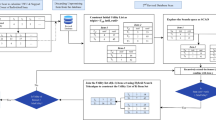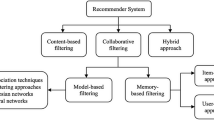Abstract
Collaborative recommender systems allow personalization for e-commerce by exploiting similarities and dissimilarities among customers' preferences. We investigate the use of association rule mining as an underlying technology for collaborative recommender systems. Association rules have been used with success in other domains. However, most currently existing association rule mining algorithms were designed with market basket analysis in mind. Such algorithms are inefficient for collaborative recommendation because they mine many rules that are not relevant to a given user. Also, it is necessary to specify the minimum support of the mined rules in advance, often leading to either too many or too few rules; this negatively impacts the performance of the overall system. We describe a collaborative recommendation technique based on a new algorithm specifically designed to mine association rules for this purpose. Our algorithm does not require the minimum support to be specified in advance. Rather, a target range is given for the number of rules, and the algorithm adjusts the minimum support for each user in order to obtain a ruleset whose size is in the desired range. Rules are mined for a specific target user, reducing the time required for the mining process. We employ associations between users as well as associations between items in making recommendations. Experimental evaluation of a system based on our algorithm reveals performance that is significantly better than that of traditional correlation-based approaches.
Similar content being viewed by others
References
Agarwal, R.C., Aggarwal, C.C., and Prasad, V. 2000. Depth first generation of long patterns. In Proc. of the Sixth ACM SIGKDD Conference on Knowledge Discovery and Data Mining, Boston, MA, pp. 108–118.
Agrawal, R., Imielinski, T., and Swami, A. 1993. Mining association rules between sets of items in large databases. In Proc. of the ACM SIGMOD Conference on Management of Data, Washington, D.C., pp. 207–216.
Agrawal, R. and Srikant, R. 1994. Fast algorithms for mining association rules. In Proc. of the 20th VLDB Conference, Santiago, Chile, pp. 487–499.
Balabanovic, M. and Shoham, Y. 1997. Fab: Content-based, collaborative recommendation. Communications of the ACM, 40(3):66–72.
Billsus, D. and Pazzani, M.J. 1998. Learning collaborative information filters. In Proc. of the Fifteenth International Conference on Machine Learning, Madison, Wisconsin, Morgan Kaufmann Publishers.
Breese, J., Heckerman, D., and Kadie, C. 1998. Empirical analysis of predictive algorithms for collaborative filtering. In Proceedings of the Fourteenth Conference on Uncertainty in Artificial Intelligence, Madison, WI.
Brin, S., Motwani, R., Ullman, J.D., and Tsur, S. 1997. Dynamic itemset counting and implication rules for market basket data. In Proceedings of the ACM SIGMOD International Conference on Management of Data, New York, ACM Press, pp. 255–264.
Chen, M.-S., Park, J.S., and Yu, P.S. 1998. Efficient data mining for path traversal patterns. IEEE Trans. on Knowledge and Data Engineering, 10(2):209–221.
Cooley, R., Mobasher, B., and Srivastava, J. 1997a. Grouping web page references into transactions for mining world wide web browsing patterns. Technical Report TR 97-021, Department of Computer Science and Engineering, University of Minnesota, Minneapolis, MN 55455, USA.
Cooley, R., Srivastava, J., and Mobasher, B. 1997b. Web mining: Information and pattern discovery on the world wide web. In Proceedings of the 9th IEEE International Conference on Tools with Artificial Intelligence (ICTAI'97).
Cooley, R., Tan, P.-N., and Srivastava, J. 1999. WebSIFT: The web site information filter system. In Proc. of the Workshop on Web Usage Analysis and User Pr ofiling (WebKDD99), Available at http://www.acm.org/sigkdd/proceedings/webk dd99/.
Fu, X., Budzik, J., and Hammond, K.J. 2000. Mining navigation history for recommendation. In Proceedings of the 2000 International Conference on Intelligent User Interfaces, New Orleans, LA, pp. 106–112.
Hájek, P., Havel, I., and Chytil, M. 1966. The GUHA method of automatic hypotheses determination. Computing, 1:293–308.
Hájek, P. and Havranek, T. 1977. On generation of inductive hypotheses. Int. J. Man-Machine Studies, 9:415–438.
Liu, B., Hsu, W., and Ma, Y. 1998. Integrating classification and association rule mining. In Proceedings of the Fourth International Conference on Knowledge Discovery and Data Mining, New York, pp. 80–86.
McJones, P. 1997. EachMovie collaborative filtering data set. http://www.research.compaq.com/SRC/eachmovie. Compaq Systems Research Center.
Resnick, P., Iacovou, N., Suchak, M., Bergstrom, P., and Riedl, J. 1994. GroupLens: An open architecture for collaborative filtering of netnews. In Proceedings of the Conference on Computer Supported Cooperative Work (CSCW94), pp. 175–186.
Sarwar, B. 2001. Sparsity, scalability, and distribution in recommender systems. Ph.D. thesis, University of Minnesota.
Shardanand, U. and Maes, P. 1995. Social information filtering: Algorithms for automating “Word of mouth”. In Proceedings of the Conference on Human Factors in Computing Systems (CHI95), pp. 210–217.
Srikant, R. and Agrawal, R. 1996. Mining quantitative association rules in large relational tables. In Proc. of the 1996 ACM SIGMOD Conference on Management of Data, Montreal, Canada.
Webb, G.I. 2000. Efficient search for association rules. In Proc. of the Sixth ACM SIGKDD Conference on Knowledge Discovery and Data Mining, Boston, MA, pp. 99–107.
Author information
Authors and Affiliations
Rights and permissions
About this article
Cite this article
Lin, W., Alvarez, S.A. & Ruiz, C. Efficient Adaptive-Support Association Rule Mining for Recommender Systems. Data Mining and Knowledge Discovery 6, 83–105 (2002). https://doi.org/10.1023/A:1013284820704
Issue Date:
DOI: https://doi.org/10.1023/A:1013284820704




